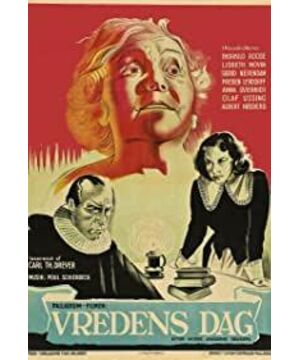A 17th century drama about the antediluvian act of witchery persecution and the excruciating human benightedness inflicted by religious indoctrination, Carl Theodor Dreyer's DAY OF WRATH is a sublimely slow-paced threnody that sets to shock and awe.
Prior to Ingmar Bergman's soul-searching felicity in psychoanalyzing our mentation on the existential basis, on that same Scandinavian land, Dreyer's moreclinical and religion-inflected study has already plunged its scalpel into the realm of complex and DAY OF WRATH, albeit its archaic subject matter , is a cinematic accomplishment nonpareil.
In the central there is a simple moral allegory, Anne (Movin) is the much younger wife of the gaunt rector Absalon (Roose), she falls for the latter's adult son Martin (Rye) from his first marriage, and her feeling is reciprocated, but their forbidden affair can never reach a happy ending because of the overshadowing witch-hunting, an example has been set by an elderly woman Marte (Svierkier), who has been accused as such and is subjected to the stake for immolation and before perishing, an anguished Marte implores Absalon in vain to save her just like he has bailed out Anne's mother from the same undoing, which also explains his unbefitting union with Anne in the first place.
Advancing with assignations with Martin and domestic hostility with Absalon's stern mother Merete (a horrific Neiiendam), Anne comes off as a self-liberating soul bent on sloughing herself from the loveless arranged marriage, she is cunning enough to ensure that Martin is on the same page with her but naively takes his affection for granted and ignores a man's guilt stemming from betraying his own father. It takes two to tango but eventually, it is only the woman who has to pay for the consequence in an era that no scientific post- mortem is at hand to find out the true cause of a death, thus it is easily to blame it on a woman's curse and then denounces her as a witch. And amplifying a mystical tenor of the occurrences, Dreyer takes an equivocal view on the witchery itself, because apparently both Merete's and Anne's curses are eventually fulfilled, so maybe they are witches after all, which sends out a contrarian message might leave viewers considerably bewildered.
Dreyer channels a more animated and poignant performance out of Lisbeth Movin's Anne in tandem with a stiffer and more forthright acting bent of other thespians, and incredibly constructs a solemn chiaroscuro environment out of its austere setting with superb compositional choices (awe-striking portraitures galore) and camera mobility, the film is draped with a vampiric ominousness even in the outdoor scenes, which is not relieved by the portentous score.
It is not a comforting chamber piece to wallow in and requires a certain acquired taste and religious nourishment for Dreyer's sense of rhythm and a story so execrably backward. But credits must be bestowed to Dreyer's symbolic coup de maître amongst others, for example, that final shot morphing from a cross to a stake is simply here to stay to remind us there is a thin fine line between religious devotion and theological abuses.
referential point: Ingmar Bergman's PERSONA (1966, 7.7/10)
View more about Day of Wrath reviews







